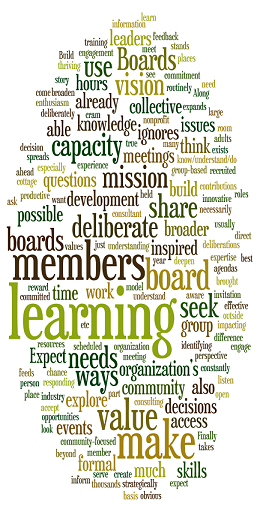 When most nonprofit leaders think of “board development,” they think of formal, group-based training events – usually held outside of regularly scheduled meetings.
When most nonprofit leaders think of “board development,” they think of formal, group-based training events – usually held outside of regularly scheduled meetings.
If the board has brought in a consultant, members want to make the most of that fee-based time; so they direct that person to cram as much information into as few hours as possible. A thriving cottage consulting industry, involving thousands of board hours every year, stands on that model.
There’s just one problem: it ignores how adults really learn. It also ignores the rich ways in which boards already are learning – and the chance to use those opportunities in more deliberate and productive ways.
Boards that value learning understand that, while formal events have a place in board development, they are not the only (nor necessarily effective) places to build collective capacity. They know that, if they’ve recruited strategically, knowledge already exists in the room – and group capacity expands when they access it. They also expect that members share expertise, skills, etc., as part of their commitment to the group and the organization. They seek it. They use it. They reward it.
Boards that value learning build their collective capacity to explore, deliberate and make decisions that advance their organization’s vision and mission. Because they are aware of the many forms that organizational knowledge takes, they are more deliberate in identifying learning needs on an ongoing basis. These boards routinely ask, “What do we need to know/understand/do to make the best possible decision?“ They seek innovative ways to meet those learning needs and use what they discover to inform deliberations. They make more thoughtful, higher-impact decisions, because they have access to a broader context for understanding and responding to community needs.
Boards that value learning
- Recruit for intellectual curiosity as much as they do specific skills or professional backgrounds;
- Expect members to look beyond the quick, obvious answers to questions – especially those impacting vision, mission and values;
- Build meetings agendas around large questions and open spaces to explore them;
- Expect members to research issues, read meeting resources ahead of time, and come prepared to engage deliberately and thoughtfully;
- Have a broader community-focused perspective on the issues, because members constantly seek out, listen to, and share stakeholder feedback;
Finally, boards that value learning create an environment where committed community leaders are able to experience true engagement, where they are able to participate in meaningful work that feeds the motivations that inspired them to accept the invitation to serve. Because they can see how their contributions make a difference, they are inspired to deepen and broaden the roles they have in vision and mission advancement. Along the way, member enthusiasm for your organization’s purpose and work spreads to those with whom they share your story.

Great post. Completely agree. A learning culture, within the context of governance and oversight, is a very good thing. I am privileged to currently serve in the context of a super smart board of directors, yet also a board with humility. They like to learn. They admit what they don’t know. And we all help each other grow stronger/better/faster (plus have a little fun along the way).
I have definitely had board experiences that are not this way. And I strongly recommend the kind of dedication to board learning that you describe here.
All the best,
Peter
I’m so grateful for your feedback, Peter – and especially interested in hearing more about the board you’ve described. I was fortunate enough to encounter a similar kind of board culture when I was conducting the research behind the approach that I’ve shared here. What struck me was how they inherently recognized they didn’t have all of the answers – and the comfort with which they regularly posed questions that naturally led them to focus on their governance responsibilities and stewardship of the vision and mission of the organization. The capacity to recognize what they don’t know, that you mention here and that I witnessed, is both especially critical and challenging.
And fun! Whew! Imagine the possibilities that exist in an environment where boards are engaged and active participants in creating something together. Love that!
As you know, I address board learning in its many forms is the focus of my blog, The Laramie Board Learning Project (http://www.boardlearning.org/). At the moment, those key posts are interspersed throughout the archives (and embedded in virtually every post. I can’t help myself.). But I plan to create a new page listing links to all entries that are learning-specific topics within the week.